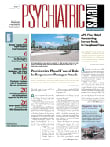As members of the newest class of APA Public Psychiatry Fellows, we attended our first Institute on Psychiatric Services (IPS) in Boston last October. The fellowship, which celebrates its 30th anniversary this year, has been sponsoring 10 residents annually for a two-year tenure to attend various APA meetings and participate in APA organizational functions.
The keystone experience is the opportunity to present a workshop or symposium at the IPS at the end of our second year.
Arriving in Boston, we were eager to see what the IPS had to offer us. The IPS is smaller than APA's other major meeting—the annual meeting in May—and for us that was good. While the annual meeting overflows with diverse learning opportunities, one can easily get lost in the crowd and become overwhelmed by the scale of the event.
By comparison, the IPS has a clear focus on public and community psychiatry, emphasizing clinically relevant scientific programs on the one hand and issues concerning public mental health policy and systems transformation on the other. We found a plethora of presentations and posters linking "big-picture" issues—poverty and homelessness, recovery concepts, and integration of mental health and primary care—to clinical practice. These sessions provided very useful clinical knowledge and helped raise our awareness of the policy and systems challenges that impact our patients and our profession.
We agreed that this is a core mission of the IPS, to link the everyday practice of individuals to the issues we face as a system of care. To our mind, this mission is of vital importance. Only when we understand how those "big-picture" issues influence each of us, we will be able to work together to critique, innovate, and improve the system as a whole.
Everyone we met at the IPS was on the same page. Such a convergence of presenters and attendees, all dedicated to creating positive change, made for a convivial and exciting atmosphere in which to learn from each other.
One of the highlights of the IPS for us was just this opportunity to network and share our experiences. We found like-minded people everywhere; among them were leaders in the field, most of whom were friendly, welcoming, and open to hearing what we had to say.
We benefited immeasurably from interaction with APA leaders at the IPS, in addition to our participation on various APA committees and councils over the course of our fellowship. Through IPS and other events, we have met recipients of other APA fellowship awards who share our commitment to service and leadership in public psychiatry. Bringing together fellows from different training programs with diverse backgrounds and experiences led to stimulating exchanges of ideas and launched fruitful collaborations.
For example, last year's second-year public psychiatry fellows collaborated to produce well-received workshops ranging from nutrition and mental health to integration of mental health in primary care medical homes. Residents were well represented in the IPS scientific program; they presented original posters, participated in collaborative workshops and panel discussions, and served as symposia chairs. It seemed clear to us that IPS encourages resident participation on all levels.
A top priority of APA is to help trainees develop into the innovators and leaders of tomorrow. Education and leadership development also take priority at the IPS each year, with attention paid to topics on clinical practice, early career development, ethics, and mentorship, among others.
For the 2011 IPS in San Francisco next month, there are several "resident-only" additions to the usual complement of posters and workshops, including a Health Services Research track. There will also be social events planned for residents, including a trainee breakfast on Friday, October 28, and a special residents-only session with APA President John Oldham, M.D., on Saturday, October 29.
We three discovered the pleasure of each other's company at the IPS. We found our respective points of view complementary, stimulating, and provocative, but always in ways that enriched and expanded the understanding of our profession. We wanted our dialogue to continue and decided to collaborate on a workshop for this year's IPS.
We look forward to going back for the innovative ideas, for the big issues being discussed, and for the assembled community of compassionate people, dedicated to public service and positive change—a community where we feel we belong. The IPS is an opportunity not to be missed, and we hope to see you there!

